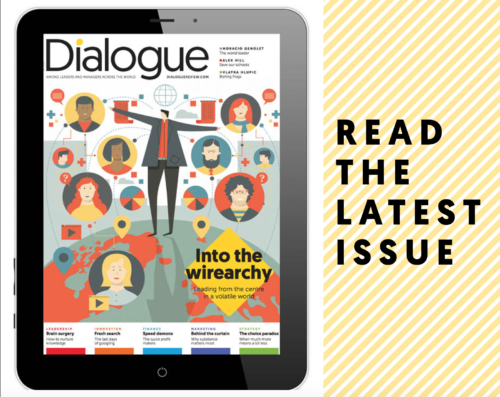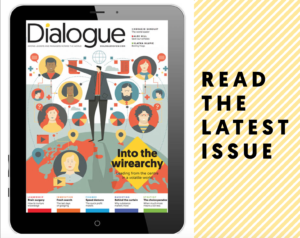Dialogue Q4 2017 is out September 1st. Here is what you can expect, from the desk of Dialogue editor, Ben Walker
[button type=”large” color=”black” rounded=”1″ link=”https://issuu.com/revistabibliodiversidad/docs/dialogue_q4_2017_full_book/7″ ]READ THE FULL GRAPHIC VERSION[/button]
The ladders are disappearing. The pyramids are inverting. Hierarchies are turning from iron to an amorphous fluid. Leadership is no longer about reaching the top and commanding a business from a pinnacle, but placing oneself at the centre of a ecosystem, like a head gardener amid the individual, yet interdependent, flora and fauna in a classic country garden. In business, the job is to unshackle, connect and nurture the people, teams, projects and things that make up the ecosystem – the network that our cover story calls ‘the wirearchy’. Professor Tony O’Driscoll briefs us on how to lead from the centre in a volatile, uncertain, complex and ambiguous (VUCA) world. The ever thought-provoking O’Driscoll provides the clearest prospectus I have read for the radical shift required to engage businesses for the VUCA future.
Wise, forward-thinking leaders have already recognized the need to transform their model, and shifted accordingly. It might come as a surprise that at the vanguard of the change is an organization unfairly maligned as conservative and inflexible – the US Army.
There is a particularly revealing passage in Michael Canning’s Upfront column where General Stanley McChrystal of the US Joint Special Operations reveals that troops trained to be efficient, robust and linear in structure weren’t suited to fighting a non-traditional enemy of the modern age, in this case Al-Qaeda. Instead, McChrystal completely overhauled the structures and processes of the operation so agility – not efficiency – was the key competency.
Loosening up is, to some degree, part of the process of making the shift. I was struck by Dr Srini Pillay’s focus on unfocusing. Pillay’s essay is simultaneously unsettling and comforting. Unsettling, because he reveals that concentration might be counterproductive. Comforting, because it turns out that daydreaming is a productive use of your time after all. Yet his call to inaction is ultimately challenging – what you thought you knew is probably wrong.
Being wrong is in fashion – look at the experience of English schools. Drs Liz Mellon and Alex Hill’s withering account of the performance of headteachers shows that only one of five leader profiles had a positive and sustained impact. Read this research – it’s an exhibition in leadership gone awry.
Where things have changed for the positive is in China. The transformation of the country over the past 30 years has been led by its entrepreneurs. Dr Jun Li’s story of their success should interest students of the new China and global business alike. Once, Chinese businesspeople were compelled to hide their light under a bushel. Now they are superstars with fanbases that would make rockstars proud.
Dialogue celebrates success. In ‘Bolts from the blue‘ you can find the results of our lead knowledge partner Duke Corporate Education’s Global Productivity Rankings. There is a theme emerging – many of the top-ranking companies are those that have disrupted industries by becoming the sort of polycentred, counter-hierarchical, fluid entities that Canning and O’Driscoll advocate. The future is already here. Unless you shift now, you might miss your chance to thrive.
Enjoy the issue.


